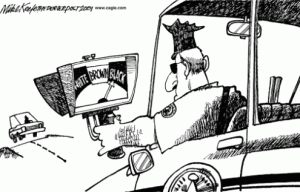On October 7, the Joint Committee on the Judiciary of the Massachusetts legislature held a marathon hearing on “Protected Classes. Privacy, and Data Collection Legislation”.
To be fair, Boston.com and the Boston Herald both reproduced an AP wire report from Steven LeBlanc that there was a hearing. But the AP mentioned only the part of the agenda dealing with a bill to ban transgender discrimination in places of public accommodation.
I’m not going to argue that transgender rights aren’t important. They matter a lot. But it’s astounding that, in a year when race and policing have been, you know, kind of in the news, only the Bay State Banner gave decent coverage to the fact that the vast majority of the bills considered at the hearing were about police, profiling, warrants and race. In the Boston Globe’s “Politics” section, they had room for two fawning profiles of elected Democrats (Attorney-General Maura Healey has “indefatigable drive and charisma“, and House Speaker Bob DeLeo has a “slimmed-down and healthier” look), but race and policing didn’t get a look in this time.
So this is what happened regarding racial profiling; I’ll follow up with further posts about the many bills on police surveillance.
Rep. Byron Rushing and Senator Sonia Chang-Diaz have been working for years to get their bill on gathering racial data on traffic stops reported successfully out of the Judiciary Committee. Every session till this one, they have gotten shut down. Word is that law enforcement have always resisted it, asking in exchange for reporting such data that they be allowed to stop motorists for seatbelt violations instead of, as is the case now, only being able to ticket seatbelt violations if they observe one after stopping the car for another reason. This has been a deal-breaker for civil liberties folks, who point out that an officer can’t genuinely tell, at speed and at a distance and often in the dark, whether someone is wearing a seatbelt or not; so such a change would merely reintroduce pretextual racially motivated stops in exchange for extra data collection. If that’s still the objection this year, it didn’t come up in public. Instead, many legislators stood in solidarity with Rep. Rushing and Senator Chang-Diaz, and a panel of the ACLU and NAACP spoke passionately for it, including a Haitian immigrant who told his story of discriminatory policing.
Did the Globe care? Did the Herald? Were they even in the room at that point? Even the Banner got a crucial point wrong. Legislators didn’t vote, at this hearing, to “advance” the “profiling bills”. In reality, the process is that the Judiciary Committee will take six to nine months to consider whether to advance them, and the public can and should lobby them in the interim. If your Representative or Senator is on the Committee, you should contact them and tell them to report it out favorably.
If we can’t even pass a very moderate bill like this one, or like Senator Chang-Diaz’s alternate bill covering both traffic and pedestrian stops, out of committee this year – a bill that doesn’t even ban racial profiling in traffic stops, but merely asks the police to collect and report data that would show how much it’s happening – then we should be mad as hell. This isn’t an issue that should only be relevant to minority legislators from Boston and the African-American press. It should be a matter for the 74% of Massachusetts residents who are not people of color to consider deeply and act upon.
One last point. Our group, Digital Fourth, considered the topic of data collection by law enforcement important enough that we incorporated very similar language into our bodycams bill, which will come up sometime this year for a hearing at the Public Safety and Homeland Security Committee. So if, once again, the Rushing/Chang-Diaz bills get blocked in Judiciary, they’ll still get a second bite at the apple. One way or another, we’re going to get this done.
An earlier version of this article is posted at Digital Fourth.
